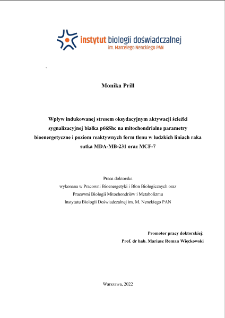- Search in all Repository
- Literature and maps
- Archeology
- Mills database
- Natural sciences
Advanced search
Advanced search
Advanced search
Advanced search
Advanced search

Object
Title: Wpływ indukowanej stresem oksydacyjnym aktywacji ścieżki sygnalizacyjnej białka p66Shc na mitochondrialne parametry bioenergetyczne i poziom reaktywnych form tlemu w ludzkich liniach raka sutka MDA-MB-231 oraz MCF-7 : praca doktorska
Institutional creator:
Instytut Biologii Doświadczalnej im. Marcelego Nenckiego PAN
Contributor:
Więckowski, Mariusz Roman (1972– ) : Supervisor
Publisher:
Instytut Biologii Doświadczalnej im. M. Nenckiego PAN
Place of publishing:
Description:
255 pages : illustrations ; 30 cm ; Bibliography ; Summary in English
Degree name:
Degree discipline :
Degree grantor:
Nencki Institute of Experimental Biology PAS ; degree obtained: 09.12.2022
Type of object:
Abstract:
Mitochondria carry out a variety of important cellular functions including ATP synthesis as well as reactive oxygen species production. They are also implicated in many crucial cellular processes, in regulation of the levels of several substantial for the cell metabolites and e.g., in the initiation of the apoptosis process. Therefore, it is not surprising that mitochondria of tumor cells could be a potential target in chemotherapy. Substantial number of evidence indicate that both, apoptosis and reactive oxygen species production involve a small p66Shc adaptor protein, which demonstrates the unique prooxidative properties comparing to other ShcA family members (p46Shc and p52Shc). Taking into account the fact that p66Shc can play a dual role as a negative regulator of proliferation and as oxidative stress sensor, p66Shc seems to be a promising target concerning cancer proliferation, tumor progression and chemotherapeutic treatment.My doctoral dissertation presents a comprehensive evaluation of the role of p66Shc protein in mitochondrial physiology of breast cancer cells. Moreover, describes response of these cells to chemotherapeutic treatment with the use of doxorubicin agent. Furthermore, the use of human breast cancer cell lines (MDA-MB-231 and MCF-7) and their genetically modified clones presenting different level of p66Shc protein allowed me to demonstrate how the p66Shc protein can affect the mitochondrial metabolism of human breast cancer cells.The comparative analysis of two breast cancer cell lines characterized with relatively different level of p66Shc and their noncancerous equivalents (MCF-10) have revealed that both tumor cell lines: MDA-MB-231 and MCF-7 being two various subtypes of breast cancer and characterized with different metastasis abilities significantly differ in most of studied cellular parameters. Furthermore, changes in the level of p66Shc protein (in individual breast cancer cell lines) exert different effects in the same clones respectively: MDA-MB-231 and MCF-7 tumor cell lines (overexpressing p66Shc protein, overexpressing of Ser36-mutated p66Shc as well as knockout of p66Shc). Knocking out p66Shc in both breast cancer cell lines caused significant changes observed mostly in mitochondrial physiological parameters. Interesting, in both of examined breast cancer cell lines, I did not found positive correlation between overexpression of p66Shc (containing serine 36 residue responsible for the prooxidative properties of the p66Shc protein) and the level of reactive oxygen species. I have shown that clone of MDA-MB-231 (which is more metastatic type of breast cancer comparing to MCF-7 cell line) lacking p66Shc protein represents the most glycolytic phenotype comparing to other
Detailed Resource Type:
Resource Identifier:
Source:
Language:
Language of abstract:
Rights:
Terms of use:
Copyright-protected material. May be used within the limits of statutory user freedoms
Copyright holder:
Publication made available with the written permission of the author
Digitizing institution:
Nencki Institute of Experimental Biology of the Polish Academy of Sciences
Original in:
Library of the Nencki Institute of Experimental Biology PAS
Access:
Object collections:
- Digital Repository of Scientific Institutes > Partners' collections > Nencki Institute of Experimental Biology PAS
- Digital Repository of Scientific Institutes > Partners' collections > Nencki Institute of Experimental Biology PAS > Dissertations > PhD Thesis
- Digital Repository of Scientific Institutes > Literature > Thesis
Last modified:
Dec 17, 2024
In our library since:
Nov 21, 2022
Number of object content downloads / hits:
313
All available object's versions:
https://rcin.org.pl./publication/273129
Show description in RDF format:
Show description in RDFa format:
Show description in OAI-PMH format:
Objects Similar
Piecyk, Karolina
Simões, Inês
Konopacki, M. [Mieczysław]
Sęk, Aleksandra
Wołosiewicz, Marcin
Strosznajder, Joanna

 INSTYTUT ARCHEOLOGII I ETNOLOGII POLSKIEJ AKADEMII NAUK
INSTYTUT ARCHEOLOGII I ETNOLOGII POLSKIEJ AKADEMII NAUK
 INSTYTUT BADAŃ LITERACKICH POLSKIEJ AKADEMII NAUK
INSTYTUT BADAŃ LITERACKICH POLSKIEJ AKADEMII NAUK
 INSTYTUT BADAWCZY LEŚNICTWA
INSTYTUT BADAWCZY LEŚNICTWA
 INSTYTUT BIOLOGII DOŚWIADCZALNEJ IM. MARCELEGO NENCKIEGO POLSKIEJ AKADEMII NAUK
INSTYTUT BIOLOGII DOŚWIADCZALNEJ IM. MARCELEGO NENCKIEGO POLSKIEJ AKADEMII NAUK
 INSTYTUT BIOLOGII SSAKÓW POLSKIEJ AKADEMII NAUK
INSTYTUT BIOLOGII SSAKÓW POLSKIEJ AKADEMII NAUK
 INSTYTUT CHEMII FIZYCZNEJ PAN
INSTYTUT CHEMII FIZYCZNEJ PAN
 INSTYTUT CHEMII ORGANICZNEJ PAN
INSTYTUT CHEMII ORGANICZNEJ PAN
 INSTYTUT FILOZOFII I SOCJOLOGII PAN
INSTYTUT FILOZOFII I SOCJOLOGII PAN
 INSTYTUT GEOGRAFII I PRZESTRZENNEGO ZAGOSPODAROWANIA PAN
INSTYTUT GEOGRAFII I PRZESTRZENNEGO ZAGOSPODAROWANIA PAN
 INSTYTUT HISTORII im. TADEUSZA MANTEUFFLA POLSKIEJ AKADEMII NAUK
INSTYTUT HISTORII im. TADEUSZA MANTEUFFLA POLSKIEJ AKADEMII NAUK
 INSTYTUT JĘZYKA POLSKIEGO POLSKIEJ AKADEMII NAUK
INSTYTUT JĘZYKA POLSKIEGO POLSKIEJ AKADEMII NAUK
 INSTYTUT MATEMATYCZNY PAN
INSTYTUT MATEMATYCZNY PAN
 INSTYTUT MEDYCYNY DOŚWIADCZALNEJ I KLINICZNEJ IM.MIROSŁAWA MOSSAKOWSKIEGO POLSKIEJ AKADEMII NAUK
INSTYTUT MEDYCYNY DOŚWIADCZALNEJ I KLINICZNEJ IM.MIROSŁAWA MOSSAKOWSKIEGO POLSKIEJ AKADEMII NAUK
 INSTYTUT PODSTAWOWYCH PROBLEMÓW TECHNIKI PAN
INSTYTUT PODSTAWOWYCH PROBLEMÓW TECHNIKI PAN
 INSTYTUT SLAWISTYKI PAN
INSTYTUT SLAWISTYKI PAN
 SIEĆ BADAWCZA ŁUKASIEWICZ - INSTYTUT TECHNOLOGII MATERIAŁÓW ELEKTRONICZNYCH
SIEĆ BADAWCZA ŁUKASIEWICZ - INSTYTUT TECHNOLOGII MATERIAŁÓW ELEKTRONICZNYCH
 MUZEUM I INSTYTUT ZOOLOGII POLSKIEJ AKADEMII NAUK
MUZEUM I INSTYTUT ZOOLOGII POLSKIEJ AKADEMII NAUK
 INSTYTUT BADAŃ SYSTEMOWYCH PAN
INSTYTUT BADAŃ SYSTEMOWYCH PAN
 INSTYTUT BOTANIKI IM. WŁADYSŁAWA SZAFERA POLSKIEJ AKADEMII NAUK
INSTYTUT BOTANIKI IM. WŁADYSŁAWA SZAFERA POLSKIEJ AKADEMII NAUK




































